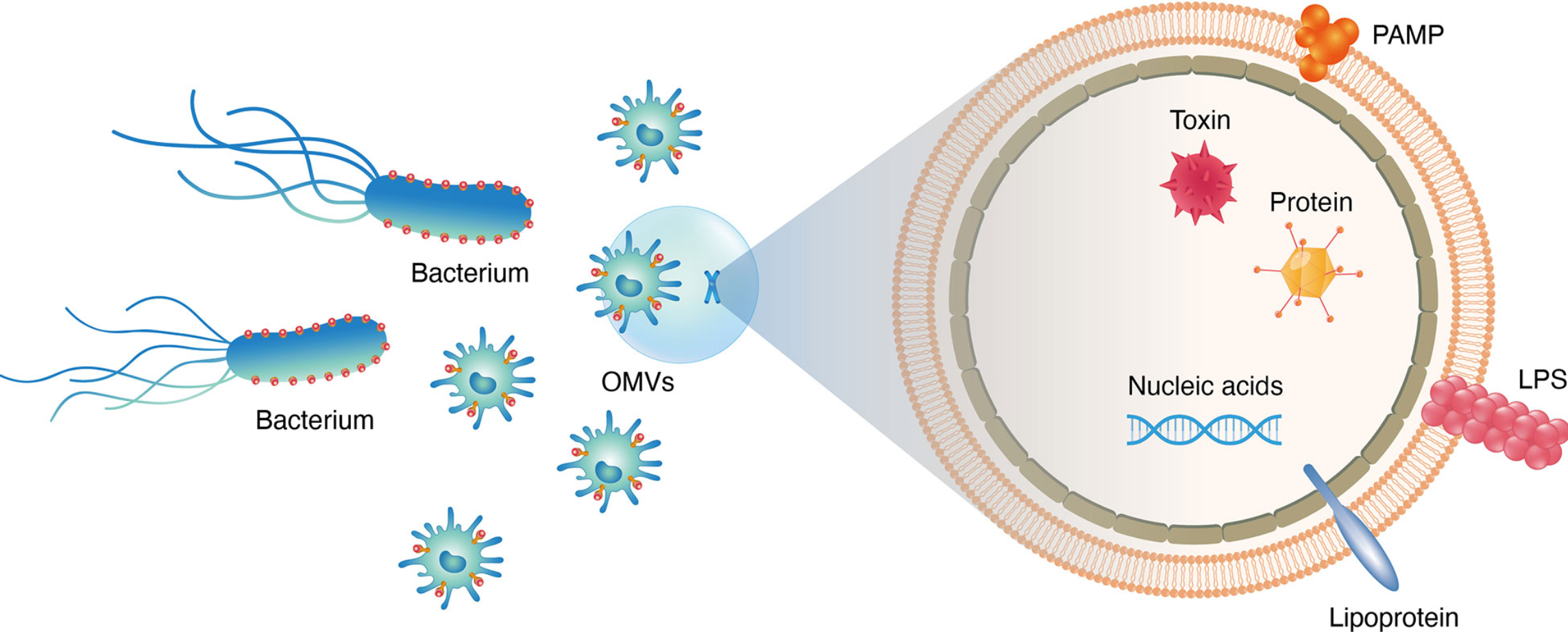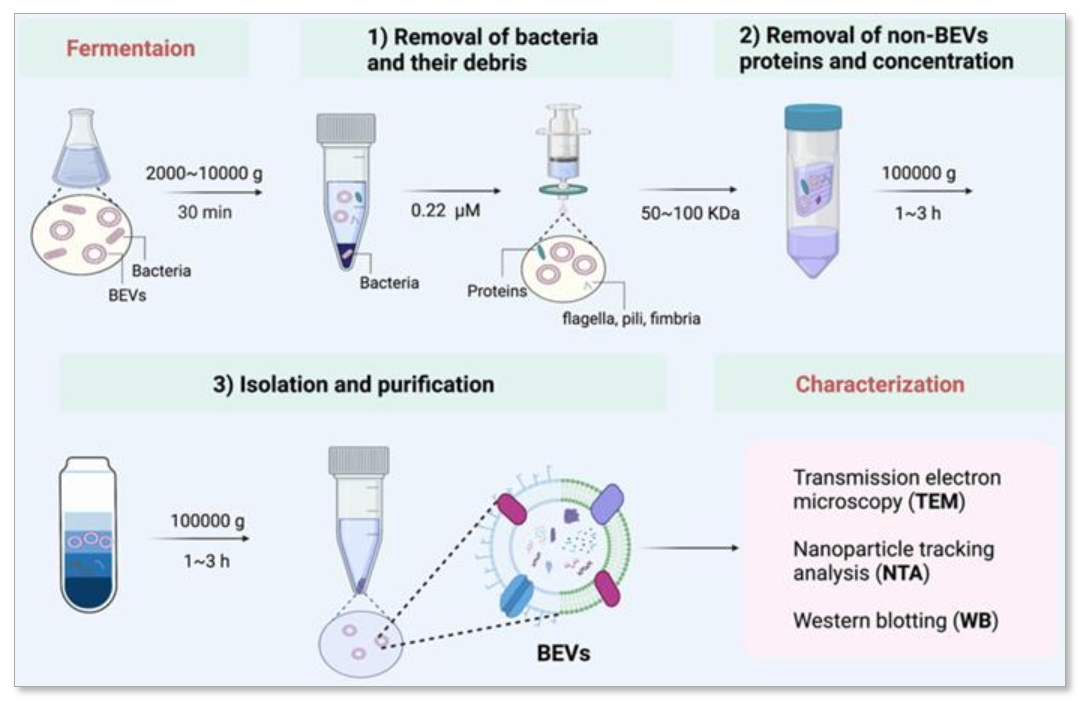Microorganism-derived Exosome Isolation and Development Service
Microorganism-derived Exosome Isolation and Development Service provides comprehensive solutions for isolating, characterizing, and engineering exosomes derived from microorganisms. MtoZ Biolabs offers a Microorganism-derived Exosome Isolation and Development Service designed to meet the increasing demand for high-quality, functional exosomes derived from microorganisms.
Microorganism-derived exosomes are extracellular vesicles secreted by microorganisms such as bacteria, fungi, and yeast. These exosomes are involved in cell-to-cell communication, carrying bioactive molecules such as proteins, lipids, and nucleic acids. Microorganism-derived exosomes play crucial roles in various biological processes, including immune response modulation, virulence factor delivery, and host-pathogen interactions. Research into microorganism-derived exosomes is vital due to their potential applications in a range of fields such as biomedicine, drug delivery, vaccine development, gut microbiome studies, and environmental sciences. Microorganism-derived exosomes offer great promise in advancing our understanding of microbial pathogenesis and developing novel therapeutic strategies.
However, Microorganism-derived exosomes are nanoscale vesicles, which makes distinguishing them from cell debris difficult. Their complex outer membrane components present another challenge. Once isolated, it is essential to accurately characterize the protein, lipid, and nucleic acid contents of these exosomes to understand their biological function.

Figure 1. Schematic of Microorganism-derived Exosome
Service at MtoZ Biolabs
MtoZ Biolabs provides cutting-edge solutions to address the challenges of microorganism-derived exosome isolation and development. Our Microorganism-derived Exosome Isolation and Development Service utilizes advanced isolation strategies such as differential centrifugation, ultrafiltration, density gradient centrifugation, immunoaffinity isolation, size-exclusion chromatography (SEC), and more, ensuring high-purity and high-yield exosome extraction. For precise characterization, we employ state-of-the-art techniques like nanoparticle tracking analysis (NTA), transmission electron microscopy (TEM), LC-MS/MS, Western blotting, and RNA sequencing, allowing us to comprehensively analyze exosome composition.
Additionally, our engineering development services include custom modifications for targeted delivery, surface modification, and drug-loading optimization, expanding the application potential of microorganism-derived exosomes. Whether for basic research or therapeutic application, we provide tailored solutions to meet your specific needs and accelerate your scientific and clinical breakthroughs. If you are interested in our Microorganism-derived Exosome Isolation and Development Service, please feel free to contact us. Our technical specialists are available to provide a free business assessment.
Analysis Workflow
1. Microorganism Culture: Optimize growth conditions and media to cultivate target microorganisms, including bacteria, fungi, protozoa, and more, ensuring maximal exosome production.
2. Microorganism Removal: Perform low-speed centrifugation to eliminate microorganism residue while minimizing exosome loss.
3. Exosome Isolation: Use ultracentrifugation, affinity chromatography, or filtration-based methods to efficiently extract exosomes from the culture supernatant.
4. Purification and Concentration: Employ size-exclusion chromatography, ultrafiltration, or affinity resins to remove contaminants and concentrate exosomes.
5. Characterization and Quality Control: Analyze exosome size and morphology using TEM and NTA. Verify exosomal molecular composition through Western blot, mass spectrometry, and other analytical techniques to ensure purity and functionality.
6. Endotoxin Removal (Optional): Endotoxin removal from exosomes using lysozyme treatment, genetic modifications, or other strategies.

Figure 2. Workflow for Microorganism-derived Exosome Isolation and Characterization. (BEV: Bacterial Extracellular Vesicles)
Service Advantages
✅Advanced Technology Platform
MtoZ Biolabs employs state-of-the-art microorganism-derived exosome isolation and development platform. Our technologies include ultracentrifugation, affinity chromatography, and filtration, combined with high-resolution mass spectrometry, TEM, and NTA for precise exosome profiling.
✅Customizable Solutions
We provide tailored microorganism-derived exosome isolation and engineering strategies to meet diverse research and therapeutic needs, including targeted drug delivery, surface modifications, and functional optimization.
✅Experienced Expert Team
Our team of experienced researchers specializes in exosome biology and proteomics, offering in-depth technical support and consultation to ensure high-quality and reproducible results.
✅Cost-effective Service
By leveraging optimized protocols and high-throughput processing, we deliver high-purity exosome preparations with rapid turnaround times, reducing costs while maintaining scientific rigor.
Applications
1. Drug Delivery Systems
Microorganism-derived exosomes are utilized as natural nanocarriers for targeted drug delivery. These exosomes can be engineered to encapsulate therapeutic agents, such as small molecules, nucleic acids, or proteins, and deliver them to specific cells or tissues, enhancing treatment efficacy while minimizing off-target effects.
2. Immunotherapy and Vaccine Development
Exosomes from pathogenic or probiotic microorganisms carry antigens, virulence factors, or immunomodulatory molecules that can stimulate or regulate immune responses. These exosomes are being explored as platforms for next-generation vaccines or immunotherapies against infectious diseases, cancers, or autoimmune disorders.
3. Diagnostic Biomarker Discovery
Microbial exosomes contain specific proteins, lipids, RNAs, or metabolites reflective of their parent microorganisms’ physiological or pathological states. Isolation and analysis of these exosomes from clinical samples (e.g., blood, saliva) enable non-invasive detection of infections, microbiome imbalances, or host-microbe interactions.
4. Host-Microbe Interaction Studies
Studying microorganism-derived exosomes provides insights into cross-kingdom communication between microbes and their hosts. These exosomes mediate the transfer of functional biomolecules (e.g., virulence factors, miRNAs) that influence host cell behavior, immune modulation, or disease pathogenesis. Such research is critical for understanding gut microbiome interactions, infectious disease mechanisms, or symbiotic relationships.

Figure 3. Immune Response Modulated by Exosomes in Pathogenic Infection
5. Agricultural and Environmental Applications
In agriculture, microbial exosomes are investigated for enhancing plant immunity, promoting growth, or delivering biocontrol agents against pathogens. Environmentally, exosomes from pollutant-degrading microbes can be harnessed for bioremediation strategies, leveraging their enzymatic cargo to break down toxins or pollutants in soil and water systems.
FAQ
Q1: What types of microorganisms are involved in your study of exosomes?
Our Microorganism-derived Exosome Isolation and Development Service encompasses a diverse range of microorganisms, including bacteria, fungi, yeast, and algae. Each type presents unique characteristics that influence exosome production, composition, and function. Our optimized workflow is tailored to the specific biological properties of different microorganisms, ensuring efficient isolation, high purity, and comprehensive characterization of exosomes.
Q2: Do you offer customization of the properties of isolated exosomes?
Yes, we offer comprehensive customization of isolated exosomes to meet specific research and application needs. Our Microorganism-derived Exosome Isolation and Development Services include size selection, surface modification, cargo loading with proteins, nucleic acids, or small molecules, and engineering exosomes for targeted delivery. Our tailored solutions ensure optimized functionality for drug delivery, diagnostics, and biomedical research.
How to order?







